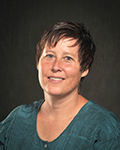
Erika Derkas
Las Vegas, N.M. — Highlands University students will have the opportunity to work on research about the feminization of higher education in Palestine, thanks to a partnership sociology professor Erika Derkas developed during a summer fellowship in the West Bank.
“I will invite my students to participate in a sociological study that will help answer the question of why the college population is predominantly female in Palestine,” Derkas said. “At Highlands, I will also examine factors that influence the higher population of female students relative to their male counterparts.”
Derkas is collaborating with a sociology professor at Berzeit University on the study.
“I think in places like Palestine and Northern New Mexico where women’s roles have traditionally been more associated with the private domestic sphere, higher education becomes particularly salient for women because it offers more opportunities in public life, including professional employment,” Derkas said.
Derkas interviewed students, faculty and educational leaders from five West Bank universities such as Al-Quds University in Jerusalem and An-Najah National University in Nablus.
“Being college educated is highly valued in Palestine. In initial interviews, the general reason given for why there are more women in college is that they are considered more vulnerable, and go to universities closer to home. It’s also thought that men might migrate more to universities outside of Palestine,” Derkas said.
Derkas and her Palestinian colleagues will explore the deeper gender dynamics involved in this issue. At Highlands, Derkas will use the same research methodology to compare and contrast university students from Palestine and Northern New Mexico.
“As a sociologist, I was chosen for this fellowship to observe firsthand how Palestinian people live with Israeli occupation, and how it shapes the fabric of their society from education to agriculture,” Derkas said. “The most surprising — and inspiring — observation I made was that despite occupation, the Palestinian people I met never articulated any bitterness or hostility towards Israeli people. Instead, they expressed optimism they would one day be able to coexist with Israelis on an equal basis.”
During the fellowship, Derkas did not talk with any Hamas affiliates, an Islamic militant group.
Israel has occupied both the Gaza Strip and the West Bank of Palestine since the 1967 Arab-Israeli War. While the deadly Israeli–Palestinian conflict escalated in the Gaza Strip in July, Derkas was in the West Bank earlier during a relatively calm period and said she felt safe.
The fellowship also included seminars at the universities, with a focus on how different Palestinian institutions, including higher education, have developed nonviolent visions for the future.
“From academics to people in the markets, there’s strong support in Palestine for Boycott, Divest and Sanction, or BDS, a nonviolent global movement aimed at ending Israeli occupation through economic and political pressure. I think the BDS movement holds promise for Palestine because the same kind of strategy helped end apartheid in South Africa,” Derkas.
She said the heart of the fellowship was to challenge assumptions about Palestinian life.
“In the U.S., we don’t get an accurate picture of Palestine. Onsite, I gained a more tangible, expansive understanding of the way social dynamics and global politics affect everyday life in profound ways. Life can unravel quickly in Palestine, and I was overwhelmed by the beauty of the Palestinian human spirit in the midst of the ongoing, relentless turmoil of occupation,” Derkas said.
She said her experience in Palestine will touch her teaching at Highlands.
“In my research methods course, I’ll incorporate new content on how to develop questions and interview people on complex geopolitical issues. In my gender, society and culture course, I have new insight to share about how all three play an important role in global conflicts,” Derkas said.
Derkas was one of 10 social scientists in the United States tapped for the Faculty Development Seminar in the West Bank through the Palestinian American Research Center.
Derkas joined the Highlands faculty in 2003. She holds a Ph.D. in sociology from the University of New Mexico, with a dissertation that focused on gender, race and ethnic relations. She publishes research on topics such as reproductive justice.
